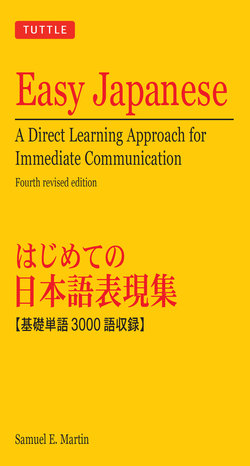Читать книгу Easy Japanese - Samuel E. Martin - Страница 12
На сайте Литреса книга снята с продажи.
ОглавлениеLESSON 5
Have You Got Any?
| Phrases | ||
| Have you got any? Have you got one? | Arimas'? (or Arimas' ka?) | |
| I've got some. I've got one. There is some (one). | Arimas'., Imas'. | |
| I don't have any. There isn't any. | Arimasen., Imasen. | |
| Have you got a light? | Matchi (or Raitā)—ari mas' ka? | |
| Do you sell beer? | Biiru—arimas' ka? | |
| Can I have some milk? | Miruku—arimas' ka? | |
| Is there any meat? | Niku arimas' ka? | |
| Please give me some. | Kudasai. | |
| Give me a ticket please. | Kippu kudasai. | |
| Hand me that book please. | Ano hon kudasai. | |
| Pass the bread. | Pan kudasai. | |
| Bring some vegetables. | Yasai kudasai. | |
| Have you got any money? Is there any money? | O-kane arimas' ka? | |
| I'm broke. | O-kane arimasen. | |
| Give me some money. | O-kane kudasai. | |
| Does your wife have any? Do you have a wife? | Ok'-san — arimas' ka? | |
| Does your wife have any money? | Ok'-san o-kane ari-mas' ka? | |
| Do you have a ticket? | Anata—kippu arimas' ka? | |
| Yes—that's right. | Sō des'. | |
| a little bit | s'koshi | |
| a lot, lots | tak'san |
| Practice | ||
| 1. | A: Chotto shitsurei. Kippu arimas' ka? | B: Watashi? Watashi— kippu arimas'. Kore— kippu. |
| A: Hai, arigatō. Tomodachi—? | B: Tomodachi—kippu arimasen. O-kane ari-mas'. | |
| A: Sō des' ka? Sumimasen. O-kane kudasai. | C: Hai, dōzo. | |
| A: Sumimasen. Dōmo. | ||
| 2. | A: Chotto, ano! | Waitress: Hai, hai. |
| A: Miruku arimas' ka? | W:Sumimasen. Arimasen. Biiru arimas'. O-sake arimas'. | |
| A: Sō des'ka? Biiru, o-sake, arimas'? Biiru s'koshi kuda sai. | W:Hai, hai.... Dōzo. | |
| A: Domō arigatō. | W:Dō itashimash'te. | |
| 3. | A: Chotto! | Clerk: Hai. |
| A: Sono f'ku— waf'ku? | C: Sō des'. Waf'ku arimas'. Yōf'ku arimas'. | |
| A: Sore kudasai. | C: Hai. Dōmo Arigatō gozaimas'. | |
| 4. | A: Anata—Ok'-san arimas' ka? | B: Hai, arimas'. Anata— arimas' ka? |
| A: Iie, arimasen. | ||
| A: Ok'-san—waf'ku | B: Ok'-san (or Kanai) | |
| arimas' ka, yōf'ku arimas' ka? | yōf'ku arimas'. Watashi waf'ku arimas'. | |
| A: Sō des' ka? Watashi—waf'ku arimasen. Yōf'ku arimas'. |
Tips
Arimas’ is another word of vague meaning “there is,” “we have got,” “I have got,” “you have got,” etc. The little word ka at the end of Arimas’ ka? is the question particle. You can ask a question without it, but you often add this particle to make the sentence specifically a question. Another particle often used at the end of a sentence is ne. Arimas’ ne means “there is some, you know” or “don’t you agree with me that there is some.” Sometimes the particle makes the meaning a little softer, or more intimate, or more sincere: Gomen nasai ne is just another way to say Gomen nasai “excuse me.” Words like arimas’ and kudasai usually come at the end of the sentence, and the word which comes at the end in English often comes earlier in the Japanese sentence.
| 1. | A: Excuse me, sir. Do you have a ticket? | B: Me? l've got a ticket. (Here) this is the ticket. |
| A: Ah, thank you. Your friend—? | B: My friend—he hasn't got a ticket. (But) he has money. | |
| A: Oh? Excuse me. Give me money. | C: Ok, here (please take it). | |
| A: Excuse me. Thank you. | ||
| 2. | A: Waitress, hey! | Waitress: Yes, sir. |
| A: Do you have any milk? | W: I'm sorry, we're out of it. We have beer. We have sake. | |
| A: Oh? You have beer and sake? Give me a little beer. | W: Yes, sir.... Here you are, sir. | |
| A: Thanks very much. | W: Not at all. | |
| 3. | A: Clerk! | Clerk: Yes? |
| A: That garment—(is it) Japanese? | C: Yes, it is. We have Japanese clothes. We have American clothes. | |
| A: Give me that one | C: Yes, ma'm. Thank you. | |
| 4. | A: You—(do you) have a wife? | B: Yes, I have. You—(do you) have one? |
| A: No, I don't have wife. Your wife—(does she) have Japanese clothes or American clothes? | B: My wife—(she) has American clothes. Me— (I) have Japanese clothes. | |
| A: Oh? Me—I don't have Japanese clothes. I have American clothes. |
